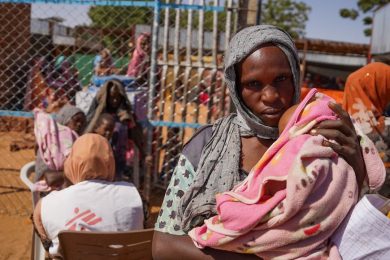Online Lesson:
These online lessons may be used:
• by individuals anytime, anywhere.
• in group settings — families, faith sharing groups, faith formation programs, and schools.
• in “flipped” classroom situations for people to view before meeting face to face.
You may just want to use a suggested video, story, or question — in anyway that helps us recognize that God’s mercy is anytime, anywhere, and we are called to be merciful as well.The structure of the lesson is based on Msgr. Francis Kelly’s Ecclesial Method.
Step 1 – Preparation: Each lesson will begin with a video and prayer to help us focus on the Works of Mercy in General.
Works of Mercy Reflection:
Think of someone you know who needs comforting. How can you answer that need?
Do you think “Momma” will remember this visit? Does it matter?
Do you think Kelly will remember this Visit? Does it matter?
Prayer:
O God of Mercy, we pray that we may be open to Your movement in our hearts.
The Spiritual Works of mercy are acts of compassion, as listed below, by which we help our neighbors with their emotional and spiritual needs.
Counsel the doubtful
Instruct the ignorant
Admonish sinners
Comfort the afflicted
Forgive all offenses/injury
Bear wrongs patiently
Pray for the living and the dead
The Corporal Works of Mercy:
The Corporal Works of mercy are these kind acts by which we help our neighbors with their material and physical needs.
Shelter the homeless/Welcome the stranger
Feed the hungry
Give drink to the thirsty
Clothe the naked
Visit the sick
Visit the imprisoned
Bury the dead
Step 3 – Explanation: This step will address a specific Work of Mercy. We will focus on Comforting the Afflicted, sometimes called Comforting the Sorrowful.
This Month: Comfort the Afflicted
Be open to listening and comforting those who are dealing with grief. Even if we aren’t sure of the right words to say, our presence can make a big difference.[The United States Conference of Catholic Bishops’ page on the Spiritual Works of Mercy]
Comforting the Afflicted, sometimes call Comforting the Sorrowful, is a spiritual work of mercy, as opposed to a corporal work of mercy, because it refers to our need to support each other emotionally and spiritually as well as helping each other with physical needs. In the video above, Kelly is comforting her mother through her presence. In the following story, Deacon Tom Frankenfield shares how that can be difficult, given our own afflictions. In his blog post, he reminds us that Jesus was about comforting others, even from the Cross, where he placed his mother in the care of John. Then he shares a story of a man who went beyond himself to reach out to another:
from “Making Choices to Alleviate Pain and Suffering – Comfort the Afflicted”
by Deacon Thomas Frankenfield
read the full blog post at
http://www.holyspiritinteractive.net/columns/tomfrankenfield/reflections/28.asp
A story of my struggle might help illustrate this point straightforwardly. These days, I suffer from very serious case of arthritis that causes me to drastically change my lifestyle. Dealing with such pain often means that I am tempted with mood swings. When things are most difficult, I find it a challenge to stay pleasant and cheerful.
One morning, I was called to visit a parishioner at local hospital. On this morning, my pain was exceptionally sharp so that I was forced to use a cane to walk. In this process, I struggled with the temptation of self pity. I asked God…why? Of course, matters got more complicate [sic] when I could not find a parking spot close to the facility and was forced to park at least 750 meters away.
As I finally approached the hospital, I was clearly struggling. This could be seen in my limping; my moaning and also though my internal grumbling. I asked God why He did not find another person to go to the hospital—one who could at least walk without pain. When I entered the lobby of the hospital, I soon discovered why God called me that particular day.
About 10 meters inside the lobby was a legless man in a wheelchair. This man greeted everyone who came in the door with a beaming smile and asked if they needed help. He offered me coffee and doughnuts as he told me that he was sorry that I was having a hard time walking. I just stood and stared!
God had clearly showed me that reaching out to others was truly possible. As I wiped the tears from my eyes, I realized that it was God who was talking to me…
Step 4 – Application and Appropriation into Life is the bridge between head knowledge and daily living as a disciple of Christ.
Faith in Action:
This video was created with an iPhone, edited in iMovie and uploaded to YouTube.
Parishes/Schools can create such resources themselves for free.
Reflection Questions:
What did someone say or do to comfort you when you were grieving a loss of someone or something very important, like a loved one or your physical or emotional health?
Geralyn Nathe-Evans founded BELIEVE.HOPE.BREATHE Life is Still Good because of
• her giftedness in ministerial skills
• her background in bereavement counseling
• her profound experience of losing her husband to cancer
What gifts, education/formation and/or experience do you have to help you comfort the afflicted?
Suggested Activities (add your suggestions below):
Family:
- Practice words to say (or not say) when you meet someone who has recently experienced a deep loss. Your can see some resources at CentraCare’s Bereavement Services.
Parish:
- Together, view the video above with Geralyn Nathe-Evans, and/or review Kristi Anderson’s Visitor article about the Wenner’s and Loch’s. The Lochs founded Finnegan’s Foundation to “help parents, and their families and friends, who are experiencing the immeasurable grief of child loss.” In the same article, Maureen Otremba offers these reflection questions:
• How do you find solace in Jesus during times of suffering?
• How can you share that comfort with someone in your life who is afflicted?
- Also, discuss how your parish is presently comforting the afflicted/sorrowful or how it could explore other ways of providing such comfort.
School:
- Ask students to explore the origin of the verb “comfort”. You may want to use etymonline.com, but don’t forget to review the site before you send your students there, as you should before having them visit any online resource. Does that change their perception of what it means to “comfort the afflicted?” Ask them to share ideas of ways of comforting people they know.
Step 5 – Celebration: Lessons will close with a prayer, silent or communally, that gives glory to God.
Closing Prayer:
Tender God,
We thank You for all the gifts You have given us. We ask You to keep us mindful of the needs of others that we, together with our Church community, can help make Your Reign become more visible in our midst. We ask this as we pray:
Glory be to the Father and to the Son and to the Holy Spirit, as it was in the beginning, is now, and ever shall be, world without end. Amen.
Sharing:
In the “Leave a Reply” area below, please suggest another activity people could do to address this Work of Mercy, share a story about someone who comforts the afflicted, or write your own prayer for people in need of comforting.























Thank you Geralyn for your testimony and your work in the area of grief and loss.
For those experiencing the lose of a loved one you know who has died by suicide, there is a group that meets the first Tuesday of each month at the Pastoral Center (305 N 7th Ave, St Cloud) from 7 to 8:30 pm. The group is designed to work through the complex emotions with support and hope of other survivors who walk alongside “through” your grief journey. The name of the group is “Healing Hearts of Suicide Survivors.” For more information, contact Roxann Storms at (320) 248-1563.
Roxann also assists women and men who are grieving the lose of a baby through the tragedy of abortion. The staff of Project Rachel program understands that feelings of grief, anxiety, guilt and anger are common not only for the woman who underwent the abortion, but also for the man involved, family, friends and even medical personnel.
The pain of loss is often buried initially, but may be manifested by relationship difficulties, depression, or other emotional and spiritual problems. For more information, contact Roxann at (320) 248-1563.